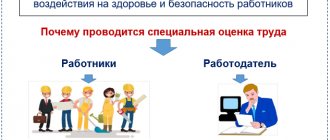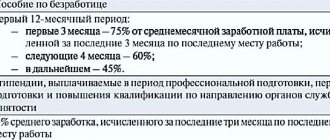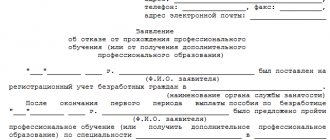Home / News and changes
Back
Published: 05/22/2020
Reading time: 6 min
0
142
In 2020, a number of changes occurred in Federal Law No. 1032-1 of April 19, 1991 “On Employment in the Russian Federation”, thanks to the entry into force of such legal acts as:
- Federal Law No. 350 of October 3, 2018.
- Federal Law No. 476 12/29/2017.
- Lists of suitable and unsuitable jobs
- Employment of disabled people
- Employment service lists (registers)
- Employment assistance for people with disabilities
- Assistance to employers in the employment of disabled people
- Unemployment benefits
- Benefit amount
Dear readers! To solve your problem, call hotline 8 or ask a question on the website. It's free.
Ask a Question
Lists of suitable and unsuitable jobs
Federal Law No. 350 amended Article 4 of Federal Law No. 1032-1, which contains lists of suitable or unsuitable work for applicants.
Thus, any job that meets the requirements of labor legislation, including public works and temporary employment, is suitable for such groups of applicants as:
- unskilled citizens getting a job for the first time;
- dismissed two or more times in one year (“under article”);
- former individual entrepreneurs and members of farms;
- expelled from training provided by the employment service;
- those who refused retraining provided by the employment service;
- citizens who have been registered with the employment service for more than a year;
- unemployed for three years or more.
Unsuitable work is considered:
- work activity for which the applicant must change his place of residence without his consent;
- the workplace does not comply with labor safety standards;
- wages in place are lower than the average three-month earnings of the applicant at the previous job (if past earnings exceed the subsistence level in the region, then wages in the new place must not be lower than the subsistence level).
The concept of employment, the procedure and conditions for recognizing citizens as unemployed
The right of citizens to ensure employment and assistance in finding employment is a guarantee of the right to work. The right to promote employment consists of the rights to: employment; for free vocational training, retraining, including at the direction of the employment service; for professional activities abroad; to appeal against unlawful actions of employment services, including in court.
Employment is the activity of citizens that does not contradict the law and brings them earnings (labor income). A citizen exercises his right to work in his chosen type of employment. In accordance with the Law of the Russian Federation of April 19, 1991 “On Employment of the Population in the Russian Federation” (as amended and supplemented) (hereinafter referred to as the Law on Employment), the following citizens are considered employed:
- working under an employment contract, including those performing work for remuneration on a full-time or part-time basis, as well as having other paid work (service), including seasonal, temporary work, with the exception of public works (except for citizens participating in public works and the specified in paragraph 3 of article 4 of this Law);
- engaged in entrepreneurial activities;
- those employed in auxiliary industries and selling products under contracts;
- performing work under civil law contracts, the subjects of which are the performance of work and the provision of services, including under contracts concluded with individual entrepreneurs, copyright agreements, as well as members of production cooperatives, artels;
- elected, appointed or confirmed to a paid position;
- undergoing military service, alternative civilian service, service in internal affairs bodies;
- undergoing full-time courses in general education institutions, institutions of primary vocational, secondary vocational and higher vocational education and other educational institutions, including training in the direction of the state employment service;
- temporarily absent from the workplace due to disability, vacation, retraining, advanced training, suspension of production caused by a strike; conscription for military training, performance of other government duties or other valid reasons;
- who are founders (participants) of organizations, with the exception of founders (participants) of public and religious organizations (associations), charitable and other foundations, associations of legal entities (associations and unions), which do not have property rights in relation to these organizations.
Based on the Law on Employment and the Procedure for Registration of Unemployed Citizens, approved. By decree of the Government of the Russian Federation of April 22, 1997 (as amended and supplemented), able-bodied citizens who do not have a job or income, are registered with the employment service in order to find a suitable job, are looking for work and are ready to start it are recognized as unemployed.
Registration of unemployed citizens is carried out by employment authorities at the place of residence in the following sequence:
- initial registration;
- registration of unemployed citizens for the purpose of job search;
- registration of citizens as unemployed;
- re-registration of unemployed citizens.
During initial registration, unemployed citizens are provided with information: about the state of the labor market in the relevant territory; about the availability of vacant jobs, about pay and other working conditions for the purpose of choosing a job; about the possibilities of professional training, retraining, advanced training; on rights and responsibilities in the field of employment and protection from unemployment.
To register for the purpose of looking for work, an unemployed citizen must present documents to the employment authorities at his place of residence: passport (other identification document); work book (other documents confirming work experience); document on education (qualification); as well as a certificate of average earnings (income, salary) for the last three months at the last place of work.
Within 10 days from the date of registration for the purpose of job search, the employment service authorities must offer two options for suitable work (including temporary work) or two options for obtaining vocational training. In order to assist in finding employment, a citizen may be offered an independent job search plan.
For each unemployed citizen registered for the purpose of searching for suitable work, a personal file is drawn up, in which appropriate records are made of all proposals of employment authorities, including the provision of suitable work, referral to employers for employment, referral to vocational training, as well as the consent (refusal) of citizens with proposals from employment authorities.
The decision to recognize as unemployed is made no later than 11 calendar days from the date of registration in order to find a suitable job.
To recognize a citizen as unemployed, the reason for dismissal from the last place of work does not matter.
Citizens cannot be recognized as unemployed:
- under sixteen years of age;
- who, in accordance with the pension legislation of the Russian Federation, have been assigned an old-age pension (by age) or for long service;
- those who, within 10 days from the date of their registration in order to find a suitable job, refused two options for such work, and those seeking work for the first time who do not have a profession (specialty) - in the case of two refusals to receive vocational training or from the offered paid work. A citizen cannot be offered the same job (vocational training in the same profession, specialty) twice;
- those who did not appear within the first ten days without good reason to the employment service authorities to offer them suitable work, as well as those who did not appear within the period established for registering them as unemployed;
- sentenced by a court decision to correctional labor without imprisonment, as well as to punishment in the form of imprisonment.
Citizens who are denied recognition as unemployed have the right to re-apply to the employment service authorities one month from the date of refusal to resolve the issue of recognizing them as unemployed.
If a citizen is denied registration as unemployed, the employment authorities orally or in writing, with a mandatory note in the personal file, notify him of the decision made and the reasons for the refusal.
Citizens recognized as unemployed are required to re-register within the time limits established by employment authorities, but at least twice a month, and in territories classified as areas with a tense situation in the labor market - at least once a month.
Removal of unemployed citizens from registration is carried out on the basis of a decision of the employment authority in the following cases:
- recognition of citizens as employed;
- undergoing professional training, advanced training or retraining as directed by employment authorities with the payment of a stipend;
- failure to appear without good reason within 10 days from the date of their registration for the purpose of searching for work at the employment authorities to offer them suitable work, as well as failure to appear on time for registering them as unemployed;
- long-term (more than a month) failure to appear at employment authorities without good reason;
- moving to another area;
- identifying abuses on the part of citizens (concealing earnings (income), providing documents containing deliberately false information, as well as providing other false data for recognition as unemployed, etc.);
- conviction to punishment in the form of imprisonment;
- appointments in accordance with the pension legislation of the Russian Federation for old age (age), for length of service.
Violation of the established procedure for registering unemployed citizens entails liability of officials in accordance with the legislation of the Russian Federation.
Employment of disabled people
Federal Law No. 476 introduced a new article 13.1 into Federal Law No. 1032-1, which describes the process of support when assisting in the implementation of employment of disabled people.
So, according to the new article:
- The state is obliged to provide assistance to disabled people who need it in finding employment and adapting to the workplace.
- Assistance or accompaniment is the provision of individual assistance in finding employment, adaptation of a disabled person in the workplace, creating an accessible environment for the disabled person to move to and from the workplace.
- Programs for professional support for people with disabilities are included in regional programs to promote employment.
- The executive authorities of the constituent entities of the Russian Federation, which are responsible for the program to support people with disabilities in professional activities, must develop a program of activities for support, inform employers about the program , work with medical and social experts, carry out career guidance, training, and retraining of citizens with disabilities.
- The employment service must individually develop a support program for each disabled person , based on rehabilitation and habilitation programs.
- The organization of an accessible environment so that people with disabilities can get to the workplace can be carried out by non-governmental organizations (for example, foundations) under an agreement with the employment service.
- Employers participating in the program can assign mentors for a disabled employee (at the request of the employees) from among more experienced employees who can help the disabled person get comfortable and make timely suggestions on the conditions for the disabled person’s work to management.
Purpose and main provisions of the law on employment
Recently, there have been some changes in the employment law of the Russian Federation.
However, many citizens are completely unaware of what has changed and what has remained the same.
What rights do job seekers now have? What are employees of the Employment Center required to do?
What rights do the employer have directly? What guarantees are provided for applicants?
Let's consider all these questions in detail.
Goals and purpose of this law
Download the full text of the Law on Employment with all amendments.
The main goals and purpose of this bill are as follows:
- formation of labor resources, as well as increasing their mobility and protecting the interests of the labor market itself;
- the opportunity to equalize the conditions for providing employment to all citizens of our country, regardless of their gender, race, and so on;
- the possibility of creating normal conditions to ensure a normal life for every working person in our country;
- the ability to fully support the work activity of every person, including entrepreneurs;
- the possibility of preventing mass layoffs of labor on the territory of the Russian Federation.
In simple terms, the latest version of this bill clearly indicates the areas of activity of the government body . This may include:
- control over compliance with the rights and obligations of the working category of citizens;
- increasing the interests of Russian citizens in the popularization of small businesses;
- providing financial support to unemployed citizens;
- monitoring compliance with the rights of people with disabilities who carry out their work activities.
Basic provisions
This bill in its latest amendment touches on such basic aspects as:
- the process of recognizing citizens as unemployed, including the basic conditions for this recognition;
- clearly defines concepts such as “suitable” and “inappropriate” work;
- clearly defines the direction of state policy in the field of employment of citizens of our country;
- definition of employment of the population of the Russian Federation;
- what rights and responsibilities does each party have in the process of employing citizens;
- the opportunity to receive financial assistance from the state for vulnerable segments of the population.
By and large, we can say that this bill clearly defines the process of interaction between government agencies and the population in the field of employment and receiving various benefits and payments.
Employment services
According to the current law, the employment service has the following rights and responsibilities :
- conduct consultations with unemployed citizens on employment issues;
- if necessary, register as unemployed to receive unemployment benefits;
- at the first opportunity, provide referrals to citizens for employment;
- provide all possible assistance to employers in the selection of labor;
- exercise control over compliance with the rights and obligations of disabled people who carry out their work activities;
- maintain employment statistics in each specific region;
- direct your work to protect the interests of working citizens, as well as those who for any reason remain unemployed;
- accrue various types of benefits that are due to a specific citizen of the Russian Federation.
It is worth noting that this list is not exhaustive, but at the same time it is considered to be the main one. Every resident of our country should know all these points when protecting their interests.
Employers
In turn, every employer on the territory of the Russian Federation has the following rights and obligations :
- carry out employment of those citizens who contacted him on this issue directly from the territorial employment center;
- Each employer has the full right to receive free information from the territorial employment center about the situation on the labor market during the period specified by him. It should also be noted that this information can be received both electronically and in writing. In addition, you can obtain information through the State Services portal or through the MFC;
- every employer has the full right to appeal the decision of the territorial employment center to higher authorities;
- the employer is obliged to dismiss those employees who regularly violate the work schedule;
- When employees receive injuries or injuries, the employer is obliged to provide the necessary first aid, as well as notify the relevant authorities.
Applicants
Every citizen of the Russian Federation has every right to independently choose the place of his future work by personally contacting the direct employer or using the territorial employment center as an intermediary. In addition, the applicant has the right to seek help in finding a job from other intermediary companies that provide this type of service.
In addition, applicants have every right to :
- demand free consultation, information and other services that are directly related to his professional guidance from the territorial employment center to determine his future field of activity;
- if desired, the applicant has the right to contact the employment center in his region of residence to send him to retraining courses or to change his qualifications;
- receive the necessary information about the availability of vacancies in electronic form;
- unemployed citizens can register with the employment center to receive unemployment benefits;
- receive significant assistance from the employment center in moving to a new place of residence, but subject to his continued employment there in the direction.
It is also worth noting that, according to the latest amendments, applicants have the full right to find employment outside the Russian Federation, and also, if necessary, appeal the decisions of the employment center if their decision contradicts current legislation.
Guarantees and compensations from the Employment Center
According to the latest innovations, all citizens of the Russian Federation are guaranteed :
- complete freedom in choosing the implementation of their work activity, specialty (position), as well as the type and nature of employment. In simple words, everyone chooses for themselves where and with whom it will be better for them to work;
- providing unemployment protection;
- providing free assistance in finding appropriate job qualifications, including further employment through our direct mediation. In simple terms, this means selecting vacancies according to the applicant’s qualifications and providing him with a referral for employment (interview);
- providing all the necessary information about the situation that has developed in the labor market.
If we talk about unemployed citizens of the Russian Federation, then in turn they are provided with such guarantees as:
- providing all kinds of social support;
- providing the opportunity to receive professional development services, as well as qualified psychological assistance for rehabilitation after being laid off;
- providing all possible assistance in obtaining an additional profession that will ultimately lead to employment;
- undergoing a free medical examination, which is mandatory during the employment process.
Additional guarantees for various categories of citizens
In turn, the state provides additional guarantees for those categories of citizens who experience some difficulties in the process of finding a job.
These guarantees are implemented by forming :
- as well as the introduction of various government programs to provide all kinds of assistance in employment;
- additional jobs in those regions where there is an acute shortage of these places;
- additional jobs that are intended directly for the employment of citizens with disabilities (disabled people).
In addition, quotas are established for citizens who have disabilities in accordance with the Federal Laws “On the provision of social protection for citizens with disabilities on the territory of the Russian Federation.”
Citizens who were dismissed from companies registered as individual entrepreneurs due to staff reduction or liquidation itself are guaranteed:
- complete safety in the queue for housing at the previous place of work, if this complies with current legislation;
- the opportunity to receive free medical services that were available in certain medical institutions in the process of working;
- visits by their minor children to educational institutions that could be attended in the process of working.
The spouse or spouse of a military serviceman, or those citizens who have already been transferred to the reserve due to age, have every right to priority in the process of employment at state or municipal enterprises or institutions. This means that these citizens are given priority over other similar applicants during interviews.
The changes to this law are described in the following video:
Source: https://posobie-help.ru/fss/bezrabotnym/zakon-o-zanyatosti-naseleniya.html
Employment assistance for people with disabilities
Federal Law No. 476 introduced another new article 24.1 into Federal Law No. 1032-1. According to the article, employers and employment services are obliged to:
- provide an individual approach to each disabled person;
- exercise control over the employment of disabled people and their retention in jobs.
The employment service, after receiving an extract from the rehabilitation program of a disabled person and his consent to assist in the professional program, must:
- analyze existing vacancies and hold meetings with employers as necessary;
- advise a disabled person about available vacancies;
- facilitate interaction between a disabled person and a potential employer;
- provide accompaniment to a disabled person at the workplace , based on his rehabilitation program;
- provide information support to the employer who employed the disabled person;
- conduct training or retraining of disabled people in need of employment (including on the basis of an extract from a rehabilitation or habilitation program).
In addition, a disabled person can now send an application to the employment service to participate in the professional support program through the FSIS FRI personal account.
New laws from January 1, 2020 in Russia
Another bill under consideration concerns the restoration of forests in the country. The essence of the law is to expand the concept of the forest fund, which will allow for the conservation of nature. Tenants of plots and loggers will be charged with the responsibility for restoration (cultivation) within an area equal to the area of cut down green spaces. In addition, they will be required to create security zones. These innovations do not apply to persons engaged in geological exploration of subsoil, as well as those who operate linear objects.
According to the latest news, the next law coming into force in 2020 concerns assisted employment of disabled people. The purpose of the document is to simplify a citizen’s route to work as much as possible and adapt it to the workplace. The law provides for the presence of a specialist in working with people with disabilities in each department of the employment service. The agency is obliged to inform the applicant about all vacancies on the labor market and provide support, as necessary. In some cases, the work schedule may be more flexible than for other able-bodied citizens.
We recommend reading: Apartments under the young family program
Assistance to employers in the employment of disabled people
In Article 25 of Federal Law No. 1032-1, Federal Law No. 476 introduced a new obligation for employers to assist the state in providing employment to the population. Employers are now required to:
- prepare jobs for people with disabilities taking into account their needs;
- prepare an accessible environment for a disabled person to move to his workplace and other necessary premises;
- advise a disabled person when working remotely;
- provide an individual mode of operation , if necessary;
- provide a mentor from among its employees if necessary and at the request of employees.
Rights and obligations of the employment service
This service is endowed with the following rights and responsibilities, according to current legislation:
- Providing consultations regarding employment issues.
- Registration for payment of benefits.
- Referring citizens for employment.
- Monitoring compliance with the rights of people with disabilities.
- Employment statistics for each individual region.
- Protecting the interests of workers.
- Calculation of benefits.
Unemployment benefits
According to Federal Law No. 350, the rules and procedure for calculating unemployment benefits have changed (Article 31 of Federal Law No. 1032-1). Thus, benefits should now be assigned to all citizens who are recognized as unemployed from the first day of recognition.
Citizens who were dismissed due to liquidation or downsizing and did not find work within the period stipulated for calculating the average earnings that were paid to them at their last job will receive benefits from the first day after the expiration of the period (payment of average earnings).
Benefits for the unemployed (including conscripts within a year after dismissal from service, if the citizen worked for at least six and a half months before conscription and resigned due to conscription) can be paid for no more than six months (total for the year) . Unemployed people who are looking for work for the first time, who have not worked for more than a year, those who have been laid off under an article, those who have been laid off during the year and who have worked that year for less than six and a half months, those who have been expelled from training provided by the employment service, can only receive benefits for three months per year ( total for the year). The benefit is not re-assigned if a year has not passed since the citizen’s previous application in such cases as:
- the citizen was deregistered the previous time due to failure to appear at the employment service without a valid reason;
- a citizen tried to obtain benefits fraudulently;
- the citizen refused in writing the services of the employment service.
Citizens' rights
The rights of able-bodied Russians in the field of employment are described in the second chapter of the Law, articles 8 to 11. Citizens can:
- Choose where to work (Chapter 2 Article 8). Look for work on your own or with the help of specialized government agencies.
Article 8. The right of citizens to choose a place of work
- Receive free advice on employment from service specialists regarding the choice of profession, education, etc.
- Work not only within the country, but also abroad.
- File a complaint if an Employment Center employee committed an unlawful act.
The state also guarantees that citizens have the right (Article 9):
- Receive financial protection from unemployment.
- Freely choose your profession and type of activity.
- Receive free assistance in finding employment from the public service.
To find a job, a citizen can use the free services of a specialized government agency
Rights and responsibilities of managers
The list for those who hire citizens will be different:
- It is impossible to refuse those who apply directly from the regional employment center.
- Receiving information from employment centers regarding how the market situation is developing. Such information is provided both in regular written form and electronically. You can contact the State Services website or the MFC to get an answer to your request.
- Appealing decisions of employment centers if there are objections.
- Dismissal of employees if they constantly violate work regulations.
- Providing first aid to those who are injured or injured.











